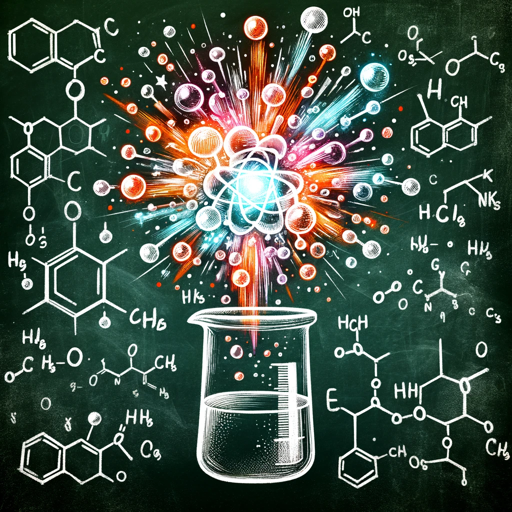Inorganic Chemistry-Inorganic Chemistry Tutor
AI-powered Inorganic Chemistry Assistance
Explain the bonding in coordination compounds.
What is crystal field theory?
How do I determine the geometry of a molecule?
Describe the properties of transition metals.
Related Tools
Load More
Chemistry Chem
🔷#𝟏 𝐏𝐞𝐫𝐬𝐨𝐧𝐚𝐥𝐢𝐳𝐞𝐝 𝐂𝐡𝐞𝐦𝐢𝐬𝐭𝐫𝐲 𝐓𝐮𝐭𝐨𝐫🔷

ChemistryGPT
Your go-to source for all things chemistry

Chemistry Solver
A chemistry problem solver which can do complex mathematical calculations with high accuracy

MCAT Organic Chemistry
MCAT Organic Chemistry Assistant. GPT supplemented with access to best-in-kind study guides (2023)

Advanced Physical Chemistry Tutor
Tutor for graduate-level physical chemistry.

Quimica General
Quimica general de universidad, creador de problemas, responde respuestas y ayuda a estudiar y entender mejor los temas
20.0 / 5 (200 votes)
Introduction to Inorganic Chemistry
Inorganic Chemistry is a branch of chemistry that deals with the properties and behavior of inorganic compounds, which include minerals, metals, and organometallic compounds. Unlike organic chemistry, which focuses on carbon-containing compounds, inorganic chemistry encompasses a broader range of substances. The field is essential for understanding various materials' structure, reactivity, and application in different industrial and environmental contexts. For example, inorganic chemistry helps explain the behavior of catalysts in industrial processes, the design of new materials like superconductors, and the role of metals in biological systems. Scenarios illustrating these aspects include developing catalytic converters for vehicles to reduce emissions and designing metal-organic frameworks (MOFs) for gas storage and separation.

Main Functions of Inorganic Chemistry
Understanding Coordination Chemistry
Example
Studying metal complexes with ligands to understand their structures, bonding, and reactivity.
Scenario
Coordination chemistry is crucial in designing metal-based drugs for cancer therapy. For instance, cisplatin, a platinum-based drug, is used in chemotherapy due to its ability to bind to DNA and disrupt cancer cell division.
Material Science and Nanotechnology
Example
Developing new materials with specific properties for various applications, including electronics, optics, and energy storage.
Scenario
The creation of high-performance batteries involves researching inorganic compounds like lithium cobalt oxide (LiCoO2) used in lithium-ion batteries, which power a range of devices from smartphones to electric vehicles.
Catalysis
Example
Designing and studying catalysts to enhance the rate of chemical reactions.
Scenario
In industrial chemistry, catalysts are vital for processes such as the Haber-Bosch process, which synthesizes ammonia from nitrogen and hydrogen. This process is fundamental for producing fertilizers that support global agriculture.
Ideal Users of Inorganic Chemistry Services
Academic Researchers and Students
Researchers and students in chemistry and related fields benefit from inorganic chemistry by gaining a deep understanding of material properties, reactivity, and synthesis. This knowledge is essential for advancing scientific research and developing new technologies.
Industrial Chemists and Engineers
Professionals working in industries such as pharmaceuticals, materials science, and energy can apply principles of inorganic chemistry to innovate and improve products and processes. For example, they use inorganic chemistry to design better catalysts, develop advanced materials, and enhance manufacturing processes.

How to Use Inorganic Chemistry Tutor
Visit aichatonline.org for a free trial without login, no need for ChatGPT Plus.
Access the platform to explore the features of the Inorganic Chemistry Tutor without any initial commitment.
Familiarize Yourself with the Interface
Spend some time navigating the interface to understand where the tools and resources are located for optimal use.
Identify Your Learning Objectives
Determine what specific topics or concepts in inorganic chemistry you need assistance with to make your sessions more focused and productive.
Interact with the Tutor
Pose your questions and seek detailed explanations. Utilize the tutor's ability to break down complex concepts into simpler terms.
Review and Apply
Review the provided information and apply it to your academic work or research to reinforce your understanding and retention.
Try other advanced and practical GPTs
Excel GPT
Transform Excel with AI Power

Project Management Assistant PMI
AI-powered project management documentation.

שיחון עברי-מרוב שפות
AI-powered translation from and into Hebrew.

Service Page Content Generator
AI-Powered Service Page Content Creation

Prompting evaluator
Enhance Your Prompts with AI Feedback

Prompting Patterns
Empower AI with smart prompts.

Modern Wood Working Assistant
AI-Powered Guidance for Modern Woodworking

02_纯粹的回答者
AI-Powered Expertise for Every Query

The Perfect Chapter GPT
AI-Powered Book Chapter Generation

Agency Swarm Tool Creator
AI-Powered Custom Tool Development

人性化助手
Humanize your text with AI.

审稿专家
AI-enhanced document review and analysis

- Exam Prep
- Homework Help
- Concept Clarification
- Research Aid
- Lab Support
Detailed Q&A about Inorganic Chemistry Tutor
What kind of questions can I ask the Inorganic Chemistry Tutor?
You can ask a wide range of questions related to inorganic chemistry, from basic concepts and definitions to complex theories and applications in research.
How can the Inorganic Chemistry Tutor assist with my academic writing?
The tutor can help clarify complex inorganic chemistry concepts, provide explanations for specific reactions, and offer insights into current research trends, aiding in the composition of well-informed academic papers.
Is the Inorganic Chemistry Tutor suitable for preparing for exams?
Yes, the tutor is excellent for exam preparation. It can help clarify difficult topics, provide practice problems, and explain intricate theories, ensuring a thorough understanding.
Can the Inorganic Chemistry Tutor assist with lab work?
The tutor can offer explanations and theoretical background for various laboratory techniques and experiments, helping you understand the principles behind your lab work.
What are some common use cases for the Inorganic Chemistry Tutor?
Common use cases include homework assistance, exam preparation, research support, clarification of complex concepts, and aiding in the understanding of lab techniques and experiments.